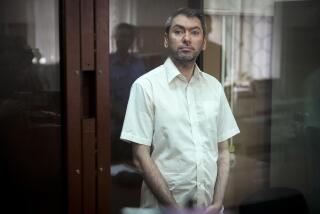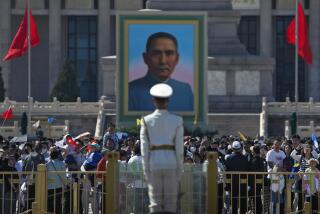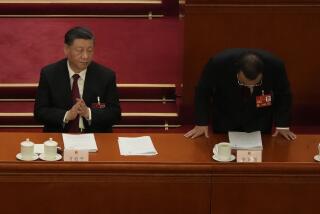‘Sakharov of China’ Ousted From Party : Physicist Fang Accused of Backing Capitalism, Protests
- Share via
PEKING — Physicist Fang Lizhi, an outspoken advocate of democracy known as the “Andrei Sakharov of China,” was expelled from the Communist Party for advocating capitalism and inciting student demonstrations, the New China News Agency said today.
Fang, 51, is the second intellectual to be expelled from the party in a mounting campaign against “bourgeois liberalism” that began after student protests erupted in at least 13 cities between Dec. 5 and Jan. 1. “Bourgeois liberalism” is defined as favoring capitalism.
Fang, who was fired last week as vice president of the prestigious National Science and Technology University in Hefei, about 560 miles south of Peking, was notified of his expulsion from the party by the party’s local Discipline Inspection Commission.
The news agency said Fang’s party branch accused him of trying to “incite intellectuals against the party and students to make trouble, causing grave consequences.”
‘Students Must Rock Society’
“Students must rock the society,” the report quoted Fang as saying. “There are many ways to win democracy, and these, of course, include some which are fierce.”
The agency said Fang made public speeches in recent years calling for the “Westernization” of China’s political and social system. “He vilified China’s socialist system as modern feudalism and a feudalism under the signboard of nationalism,” it said.
Also today, East European sources said Communist Party chief Hu Yaobang was ousted last week because he tried to implement liberal reforms too quickly.
No details of the reason for Hu’s ouster have been publicly announced.
Accused of Opposing Deng
The sources said the new party chief, Zhao Ziyang, made the remark in a meeting in Peking Sunday with Havasi Ferenc, a leader of Hungary’s ruling Socialist Workers Party.
Zhao reportedly also accused Hu of opposing the policies of Chinese leader Deng Xiaoping.
Zhao contended that Hu, a close ally of Deng for four decades and once considered his likely successor, wanted to go much further than Deng in promoting reforms, the sources said.
Since he emerged as China’s leader in the late 1970s, Deng has introduced a series of capitalist-style economic reforms and has tried to reduce the role of the Communist Party in day-to-day administration.
More to Read
Sign up for Essential California
The most important California stories and recommendations in your inbox every morning.
You may occasionally receive promotional content from the Los Angeles Times.













